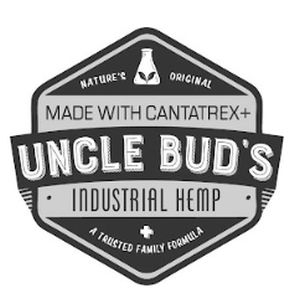
The Trademark Trial and Appeal Board affirmed the Trademark Office's refusal of CBH International LLC's application to register the composite word-and-design mark depicted above for CBD-based transdermal patches. Although CBH argued that its goods could be sold legally without going through the FDA approval process applicable to drugs, the TTAB disagreed, and therefore concluded that CBH lacked a bona fide intent to use its mark in legal commerce. CBH's application covered the following goods:
[T]opical analgesics; analgesic balms; all of the foregoing containing ingredients naturally occurring in industrial hemp with a delta-9 tetrahyrocannabinol [sic] (THC) concentration of not more than 0.3% on a dry weight basis, in International Class 5.
(corrections in opinion).
Products containing cannabidiol (CBD) with less than 0.3% THC that are intended for medical use cannot support federal trademark registration if the applicant does not obtain and timely file an approval from the Food and Drug Administration ("FDA") to market the product. Even though CBD products containing less than 0.3% THC are no longer banned under the federal Controlled Substances Act, when such products claim a medical benefit or an effect on the body, they are regulated (like any other drug) under the federal Food, Drug and Cosmetics Act ("FDCA"), and may not legally be sold without FDA approval. The PTO considers sale of CBD products claiming medical benefits without FDA approval to be insufficient to constitute lawful use in commerce. Here, CBH's application was refused because the applied-for CBD goods were "drugs [that contain CBD] intended for the cure, mitigation, treatment or prevention of disease and/or intended to affect the structure or function of the body," but they were being offered without FDA approval, and CBH therefore failed to show a bona fide intent to use its mark in lawful commerce.
CBH appealed that refusal to the TTAB. On appeal, CBH argued that: (1) the FDA did approve its goods, and (2) its goods are lawfully used in commerce because they are not drugs subject to FDA approval. The TTAB rejected both arguments and affirmed the refusal.
CBH Failed to Timely Submit Purported Evidence of Legality
Before the TTAB considered the merits of the refusal, it first addressed the evidentiary issue of whether CBH timely submitted evidence that it claimed showed that its goods were legal.
In its reply brief (dated September 18, 2022), CBH attached—for the first time—an "opinion letter" dated December 31, 2020 from a private regulatory consultant opining on the legality of CBH's goods, which, according to CBH, demonstrated that it "does have FDA approval for the amended goods." The letter did not state that the CBD ingredient in CBH's goods had attained FDA approval as a new drug; rather, it stated that a different ingredient, trolamine salicylate, had been pending final FDA action since 1983 and could meanwhile be legally marketed until the FDA issued a final monograph.
CBH requested remand for the Examining Attorney to consider the letter. The TTAB, however, determined that remand was unwarranted because CBH had waited too long to provide this evidence. A request for remand must be supported by a showing of good cause, and good cause depends on the stage of appeal and the reason for the delay. As the TTAB noted, "the later in the appeal proceeding that the request for remand is filed, the stronger the reason that must be given for good cause to be found."
Here, CBH made its request for remand "at a very late stage—in [CBH]'s reply brief." Additionally, the letter it sought to submit was dated December 31, 2020, which indicated that CBH "had the 'opinion letter' in its possession for the entire pendency of the present appeal and well prior to the issuance of the Final Office Action, which was mailed on October 28, 2021." Thus, the Board concluded that CBH had failed to establish good cause for its eleventh-hour submission, and accordingly denied CBH's request for remand and declined to consider the "opinion letter."
The TTAB also briefly considered CBH's evidentiary objection to the Examining Attorney's attachment of the dictionary definition of an "analgesic" to her brief. While the TTAB found that it was improper for the Examining Attorney to attach new evidence to her brief, it nevertheless held that it was permitted to take judicial notice of dictionary definitions and therefore considered the Examining Attorney's evidence.
CBH Failed to Show a Bona Fide Intent to Use Its Mark in Lawful Commerce
A trademark applicant may apply to register a trademark under Section 1(b) of the Lanham Act, 15 U.S.C.§ 1051(b), which requires the applicant to demonstrate a bona fide intent to use the trademark in commerce. However, use in commerce must be lawful to serve as the basis for federal registration. In other words, a mark is ineligible for federal trademark registration where the associated goods or services are "illegal under federal law."
Applying these principles, and having declined to consider CBH's "opinion letter," the Board found that CBH did not have a bona fide intent to use its mark in lawful commerce "because the identified goods are a per se violation of the FDCA, 21 U.S.C. §§ 321(g)(1), as they are drugs intended for the cure, mitigation, treatment or prevention of disease and/or are intended to affect the structure or function of the body and contain CBD." Under the FDCA, "any product intended for use in diagnostics, cure, mitigation, treatment or prevention of disease and/or intended to affect the structure or any function of the body is a drug." And "[n]ew drugs may not be legally introduced or delivered for introduction into interstate commerce without prior approval from the FDA," either through "an FDA-approved new drug application (NDA) or an abbreviated new drug application (ANDA)." Moreover, the FDCA regulates the use of CBD chemical compounds when intended for medical use, and over-the-counter pain-relief products containing CBD "are not legal under the FDCA."
The TTAB held that CBH's description of its goods and the record evidence demonstrating how CBH describes its products on its website demonstrated that CBH's goods are covered by the FDCA. First, CBH described its goods as "analgesics," which are defined as "medication that reduces or eliminates pain." "[M]edication," in turn, is defined as "a drug or other substance used to treat disease or injury." Second, CBH's website advertises "Uncle Bud's 35mg CBD Transdermal Patch" as "medical grade." The product description states: "our advanced nano-emulsifying technology allows for a more efficient delivery of CBD allowing for a more immediate and longer lasting effect on the body." Based on these descriptions, the TTAB held that CBH's goods are definitionally covered by the FDCA because they are "intended for the mitigation of disease and/or . . . intended to affect the function of the body." Because there was no record evidence of an NDA or ANDA, the TTAB concluded that CBH's products were unlawful under the FDCA. Absent a showing of lawfulness, the TTAB determined that CBH's goods "could not be lawfully introduced into commerce as of the filing date of the involved application" and therefore CBH "did not have the requisite bona fide intent to use the mark in lawful commerce in connection with such goods."
While the PTO routinely allows intent-to-use applications for pharmaceutical products that, as of their filing date, have not yet attained FDA approval, here CBH relied on the position that its goods could be lawfully marketed without ever pursuing the NDA/ANDA process—a position that the TTAB rejected.
CBH also attempted to argue that its applied-for mark should be registered nevertheless because CBH already owned a prior registration for a virtually identical mark containing UNCLE BUD'S, which also identified topical analgesics containing CBD derived from hemp. However, the TTAB rejected this argument because the TTAB is not bound by prior decisions of Examining Attorneys. The TTAB also pointed out that the prior mark was registered before the 2018 Farm Bill, which removed hemp with less than 0.3% THC from the Controlled Substances list, and before the FDA issued subsequent clarification regarding CBD (which developments led the PTO to refine its examination policy for applications identifying CBD-containing goods).
The case is In re CBH Int'l, LLC, Serial No. 88979768 (TTAB Jan. 3, 2024).
The content of this article is intended to provide a general guide to the subject matter. Specialist advice should be sought about your specific circumstances.



